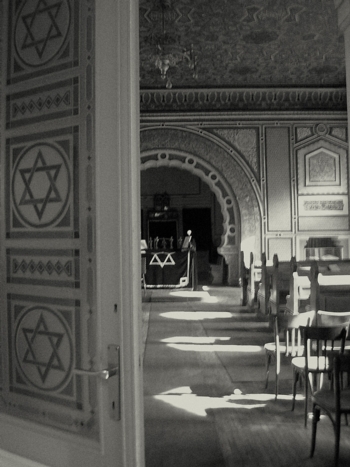 February 08
February 08
Why Pray?
Rami Shapiro
This essay was originally published in April, 2007, in the Spring/Summer 2007 print edition of Zeek. Our print edition features original articles, essays, poems, and art. To subscribe, visit www.zeek.net/buy.
 I’m new to prayer. True, I was raised on davvenen and tefillin, and I have spent a lifetime reading aloud to God from a siddur, but prayer - actually talking to God - was reserved for emotional foxholes and college finals.
I’m new to prayer. True, I was raised on davvenen and tefillin, and I have spent a lifetime reading aloud to God from a siddur, but prayer - actually talking to God - was reserved for emotional foxholes and college finals.
For me, God is Reality, everything that was, is, and will be. God is not a being but Being itself. God is Ehyeh asher Ehyeh (Exodus 3:14): not the fixed and static I Am that I Am, but the fluid, creative, unbounded I Will Be What I Will Be that burns through theological speculation and leaves the seeker in joyous freefall of not-knowing.
I had no need to pray to God for there was no Other “out there” to whom to pray. Meditation made more sense, and I took that up with a vengeance. Yet after decades of sitting on cushions and, as I got older, chairs, I felt called to pray. Something was missing in the silence of meditation. While formal prayer was for me a musical score without rests, and hence merely noise, meditation had become a score without notes, and hence merely quiet. I valued the silence, but I wanted the sound. I wanted to talk to God, yet having for so long focused on the nondual No-thing I just couldn’t talk to the supremely dualistic Something.
All that changed in the late 1990’s when God began talking to me. “If I am truly nondual as you claim, then I am Other as well as Self, the Many as well as the One, the Wave as well as the Ocean. Do not proclaim My creativity and then imprison Me in your lack of it.”
I actually heard this. I was experimenting with Reb Nachman of Breslov’s hitbodedut practice, isolating myself with God for an hour or more each day, and pouring my heart out about every aspect of my life. I did this for weeks before I heard what the ancient rabbis called a Bat Kol, the Daughter’s Voice, an auditory meeting with God. For me the Voice was clearly female, and it heralded an encounter with Shechinah, the feminine Presence of God, that led me to the Divine Feminine, God as Mother.
“You see, Sweetheart, if I am all things, I am self and other, and that which transcends them both. Don’t see me in the tree - see me as the tree. Don’t see me in yourself see me as your self. I am both formless nonduality and the splendor and gore of infinite variety. When you sit in silence and your story fades, you and I fade as well, leaving only formless bliss. But when you pray, chant, and talk to Me, you and I arise together to chat. The silence is true, and so is the talk. Just don’t be attached to either.”
So began my daily conversations with God, the Divine Mother, an all-embracing presence whose unconditional love burns away the self-serving dramas of my life and leaves me without defenses or hideouts. Her answer to my prayers is always the same: “Sweetheart, drop the drama and look at the truth, then you will know what to do, even if you choose not to do it. Here, let me help you.”
God’s help is rarely pleasant. Having my story wrenched from my grasp, being stripped naked emotionally and intellectually, and forced to see what is rather than what I so desperately want there to be, is humbling and often terrifying, and always profoundly liberating. And it is done with such love and compassion that in the end I fall into Her arms in selfless surrender.
“I won’t clean up the messes you make,” She tells me, Her voice always soft, compelling, and (sometimes frighteningly) inescapable. “And I will be with you while you make them and with you while you unmake them. I will never condemn you, but I will laugh at you. Learn to laugh with me and you won’t make so many messes in the first place.”
 I think the Mother and laughter go together. Sarah laughed and denied it (Genesis 18:12). She named her son Laughter (Isaac) but feared when he played with Man-of-God (Ishmael) (Genesis 21:9). In this she brought much suffering to the world, a suffering that lingers even now. In her shame and fear she taught us how to fall from grace, and hence how to return to it as well. Recovering laughter and learning to play is key to spiritual maturation. But today’s religion and formal prayer leave little room for play.
I think the Mother and laughter go together. Sarah laughed and denied it (Genesis 18:12). She named her son Laughter (Isaac) but feared when he played with Man-of-God (Ishmael) (Genesis 21:9). In this she brought much suffering to the world, a suffering that lingers even now. In her shame and fear she taught us how to fall from grace, and hence how to return to it as well. Recovering laughter and learning to play is key to spiritual maturation. But today’s religion and formal prayer leave little room for play.
At its best religion is myth, jazz, poetry, and play. We make it up, and it makes us up, and in this sacred invention is the possibility of discovering that God is all. But when we take it too seriously we rob ourselves of joy, lose all hope of discovery, and suck the very life out of faith. It is like graduating from stickball to the major leagues; the game is no longer played but managed. We boo and cheer but we no longer laugh.
It is the same in the prayer services I experience in synagogues around the country. Everything is so serious, scripted, and safe. There are no surprises. We know exactly what is coming and what to do when it comes. We call out that God is one (Adonai echad) and rarely notice that God is the very one sitting next to us and in front of us and behind us. We say that God’s love is unending (ahavah rabbah) yet never let it sear away the narcissism and self-pity that fuels the false self we insist upon calling “me.”
I value synagogue and liturgy for the community it offers, but when it is God I seek, my shul is the forest, my liturgy the chanting of Her Names, and my prayer the unscripted dialogue of Psalm 42:7: deep calling to deep.
Rabbi Rami Shapiro is an award-winning poet and essayist who has written over a dozen works of poetry, liturgy, fiction, and nonfiction.









